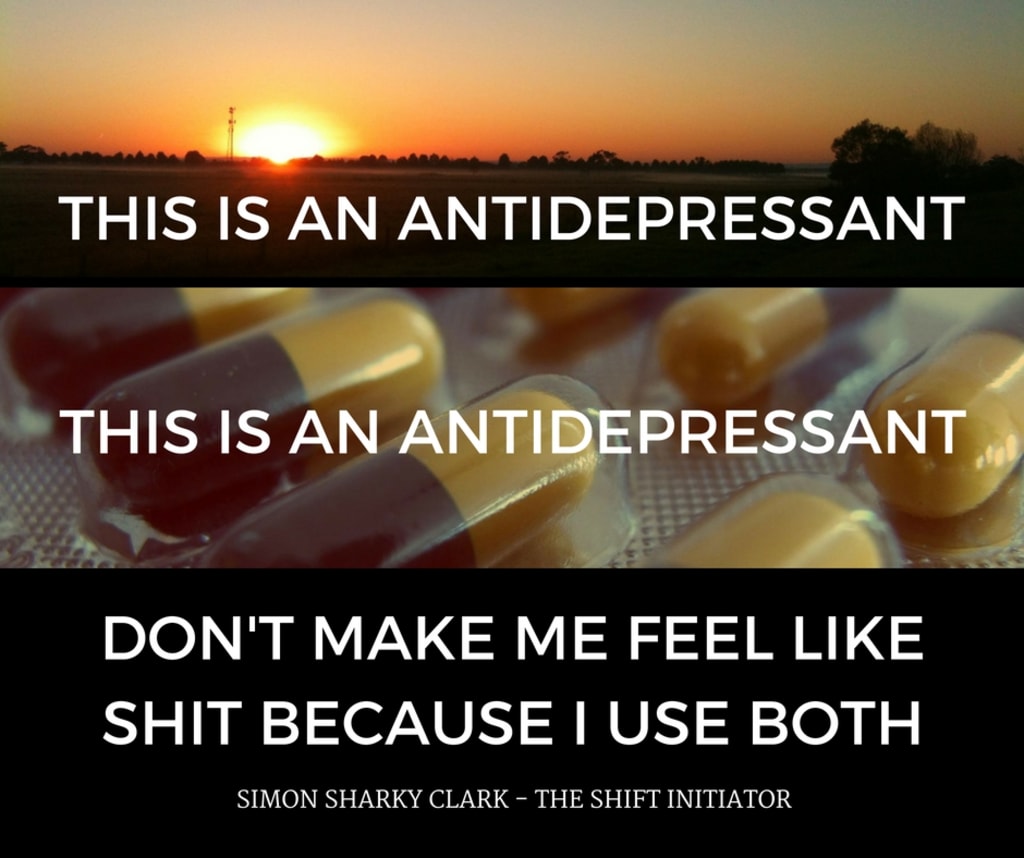
The above is a version of a common meme that we all have seen online and it is essentially saying that the only treatment that you need for mental health issues is to walk them off and forget that they exist. This will essentially be the cure-all for what is bothering you and all will be fine! I decided to post this in my article with the bottom part added to it. The main reason I am writing this article is to show what is hopefully the proper way society should be towards mental health treatment and not just have the “walk it off” attitude.
Ask yourself these things!
- Can you walk off a broken arm?
- Can you walk off being deaf?
Before reading any further think about the message that the meme, without the bottom part, portrays. Think about just the meme for five minutes! Then for another few minutes think about the message that it portrays and this time include the bottom part of the meme.
Think about which of these messages within our society is more prevalent. Which one is most likely (unless you lived your entire life under a rock) to be found on various social media outlets?
“The anti-vaccine movement is along the same lines and the anti-GMO movement. Why do people distrust science so much? Why do people continue to allow seeds of doubt planted by internet memes, hoaxes, and conspiracy theories get watered and allowed to grow and overshadow scientific evidence?"When the scientific proof is there that treatments are necessary and self-proclaimed why do people continue to distrust their validity?
This above quote says a lot. It is a phrase used to describe people who have this attitude and is commonly referred to as Dunning Kruger Effect, or as I like self-proclaimed expert effect.
Even when this attitude is not referring to mental health, the ripples that this attitude cause to all aspects of our healthcare systems are the same. This negative attitude definitely impacts such areas as mental health and addictions treatment, nutrition, and the choices made on whether or not to have vaccinations given, to name just a few areas. Although these issues are not the same, for the most part, I find that in today's world of social media, Google and so on that people tend to think they are more informed than they actually are. If it is on the internet, of course, it has to be 100 percent fact. These areas may seem small and insignificant to individuals who experience little to no issues in the respective areas. To individuals suffering from any of the above-mentioned issues or any other issue on a daily basis, informed, educated options are what they need.
I'll give you an example of my personal inspiration for writing about this topic. I have ADHD and take Concerta 36 mg a day for my prescription. Throughout my life, especially when I was taking Ritalin, the most common things I've been told about my mental health issues and the pharmaceutical interventions I use to treat it are 'My prescription is an excuse to be lazy and stupid, ADDuhhh, and so on.' This is a very unhealthy mindset to have, especially in the mental health field. Most of the people who have this attitude don't even know what the acronym DSM stands for or think it's something made up by therapists and pharmaceutical companies to make money.
The relevance of this attitude stems from various forms of cognitive biases. “A cognitive bias is a systematic error in thinking that affects the decisions and judgments that people make. Sometimes these biases are related to memory. The way you remember an event may be biased for a number of reasons and that in turn can lead to biased thinking and decision-making.” The attitude can also stem from stereotypes, one sided documentaries and stories portrayed throughout various forms of media. The issue is that we, as a society, give too much relevance to so called facts that are completely irrelevant. What is so problematic is that those so called facts can do so much damage to individuals and especially to individuals who have mental health issues.
I think that's one of the most important points that come across to me personally is how in a world where we can literally fly unmanned spacecraft across this wonderful galaxy of ours, it continues to baffle me how people can remain so unevolved in their thoughts and beliefs towards mental health issues!
There are numerous other examples I could use to illustrate the dangers involved in having a mindset such as the one discussed above. Basically, people who have overbearing opinions regarding a topic which they have absolutely no education or experience dealing with are given way too much credibility in today's society. On the other side of the coin, people with an education and experience with certain topics are not given enough credibility in today's world. This, too, is a root cause of many issues we have in today's world.
The following is a short summary of some of the main points raised by Dunning and Kruger and some of the ideas which tend to make up a Dunning-Kruger world. The Dunning-Kruger world can essentially be looked at as including the people who are quite over-opinionated about an issue when in reality they have little to no real knowledge about the issue.
Even though this is something that has been explained multiple times, especially recently in politics, I want to use it to partially explain where Mental Health Stigma originates. What I am attempting to do is point out the short term and long term effects that this attitude has towards reinforcing stigma in today's world in my first article regarding this issue. The reason for doing this primarily is not to educate people about mental health stigma so they stop using this attitude as that is, in reality, my secondary goal. My reason for writing this is for the person who is made to feel as if they are worthless for having an “imaginary” condition which isn't actually real. This is so untrue and individuals with mental health issues need to know their conditions are real and they have a right to proper medical care and information regarding their personal conditions.
Let's be honest with ourselves. People should not feel bad about seeking help. Seeking help because of a mental health issue doesn't make you too lazy to deal with it and people really shouldn't have the right to bash or abuse a person who seeks help with his / her issues. My goal is to educate the people who suffer day in and day out from the damaging effects of this epidemic in today's world for my first of a four part series of articles regarding this issue.
What the self-proclaimed expert mindset does is cause damage. It can almost assuredly negatively impact various types of medical interventions, due to the negative experiences (reinforcement) people get when being open about their treatment and issues that they have to deal with on a daily basis.
The way that we relate things in our lives depends on a few basic things:
- One is the experience itself.
- The conscious things which help shape the way we think and feel about the experience about which the individual is aware.
- The conscious things that shape our thoughts and feelings about which individuals are not aware.
“Stigma or discrimination attached to mental illnesses presents a serious barrier, not only to diagnosis and treatment but also to acceptance in the community.”
“Almost one-half (49 percent) of those who feel they have suffered from depression or anxiety have never gone to see a doctor about this problem.”
Below is a quote a person said to me one time when they were frustrated with how people reacted to their mental health issues:
“It's so hard to explain to someone who does not experience it without sounding like you are just whining and thus perpetuating the cycle. "
The negative reinforcement caused by stigma, especially with individuals who know little but feel morally obligated to voice their opinions regarding the topic, has undoubtedly led to many individuals suffering from mental health issues to go undiagnosed and untreated. It becomes too 'embarrassing' for them to seek the help they need! Stigma can significantly affect someone's life and can come from anywhere. Some areas from which stigma can arise are media, social situations, yourself, work, religion, and school.
When individuals who are already self-conscious about having a mental illness or learning disability have negative feedback in any situation, it affects their treatment and self-image. This effect can be so serious at times, as I have mentioned previously, that it can lead to situations from the individual quitting their treatment to taking his / her own life or the lives of others and anything in between. It does this by making people hesitant and made to feel as if they are a bad person or that they are too lazy to deal with their problems.
Doing so almost causes a snowball effect with their treatment!
Think of it like this: as a snowball rolls down the hill it gets bigger and bigger, picking up whatever is in its path. Think of the snowball as a mental health issue, and the hill is the problems associated with stigma. The larger it gets the more serious and larger the problem becomes.
By not dealing with the main problem, it undoubtedly can become worse. It actually adds to the main issue and complicates it even more. By not dealing properly with the main issue, other problems can be created which can lead to these problems severely interfering with the life of the individual involved. Just as the snowball gets larger as it progresses, so too do the problems associated with mental health issues if the individual does not receive the proper treatment! What could have started as a single issue or two has the potential to grow into multiple issues!
We need to understand the importance of filtering out the negative non-essential opinions that stigma causes. We need to stop trying to educate people who don't care about anything other than themselves and people whose opinions agree with what they believe to be true.
The reason why we need to do this is due to people who have no respect for mental health issues. Even with all the education out there, they aren't going to have their minds changed.
Start with building ourselves up and take advice from qualified medical professionals instead of people who think they are experts because they can use the phrase “big pharma” and copy and paste YouTube videos to validate their points.
“The only shameful thing about mental illness is the stigma attached to it. A lack of understanding when it comes to these disorders can leave sufferers feeling isolated and hopeless. Only 25 percent of people with mental health issues feel that people are caring and sympathetic toward their struggles."
Although society has shown growth in understanding mental health, there still exists more negative than positive opinions regarding people who have mental health illnesses. These negative opinions from society are completely unnecessary and can potentially lead to more problems for the individual experiencing a mental health illness. With the proper tools and having an understanding and education in place, life can be so much easier for all people involved not just the person who has some form of mental illness.






Comments
There are no comments for this story
Be the first to respond and start the conversation.